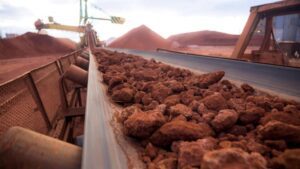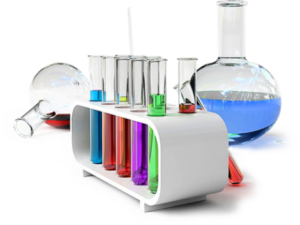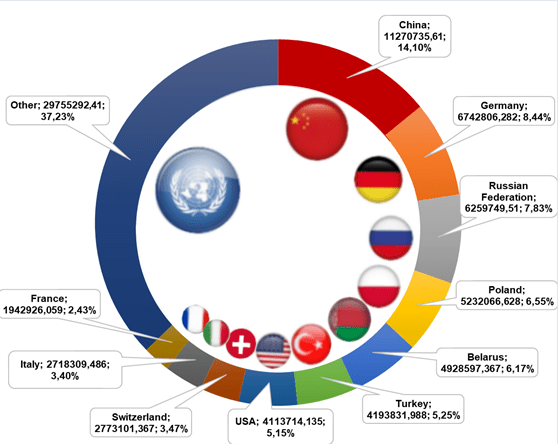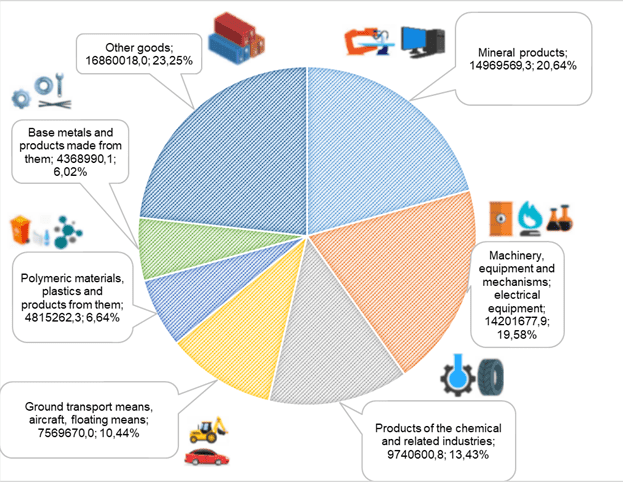
In January-April this year, Ukraine reduced the import of aluminum ores and concentrate (bauxite) in quantity terms by 47.5% compared to the same period last year, to 932,928 tonnes.
According to statistics released by the State Customs Service, during this period, bauxite imports in monetary terms decreased by 42.3%, to $46.830 million.
At the same time, imports were carried out mainly from Guinea (60.58% of supplies in monetary terms), Brazil (27.96%) and Ghana (7.64%).
Ukraine did not re-export bauxite in January-April 2022.

Ukraine, with the help of Western partners, has managed to significantly increase fuel imports from EU countries, as a result, in May the country will receive 350,000 tonnes of fuel via completely new logistics routes, the Ministry of Economy has said on its website.
“In March-April 2022, measures were introduced that made it possible to increase the daily volume of fuel imports from the EU from 4,000 tonnes to 12,000 tonnes per day,” the ministry said.
Among the measures taken that ensured such growth, the Ministry of Economy named the abolition of entry permits for tankers to deliver fuel to Ukraine, ensuring the ability to receive fuel in the ports of the Danube, adjusting the mechanism for price regulation of the cost of fuel and extraordinary clearance of fuel at the borders by customs and border guards.
“Thanks to this, five times more fuel was delivered to Ukraine by railroad. In March, 35,000 tonnes were delivered, in May we expect 180,000 tonnes. Imports by road increased 15 times – from 5,000 tonnes to 85,000 tonnes. Transportation by river now brings five times more fuel compared to March – from 4,000 to 22,000 tonnes,” First Deputy Prime Minister Yulia Svyrydenko, Minister of Economy, is quoted in the report.
According to the Ministry of Economy, there is also an agreement to start reversing fuel by pipe transport from Hungary: Ukraine received confirmation to import 35,000 tonnes per month, with a potential increase to 50,000 tonnes.
In addition, customs launched a separate green lane for fuel trucks from Poland, which will potentially increase the pass from 110 to 200 trucks per day.
“Today, the entire volume of imports can be directed to domestic consumption. Building up stocks requires more time. For queues and shortages to disappear, fuel supplies at filling stations are required for at least 15 days,” the ministry said.
Among the tasks for the near future, it named obtaining the consent of the EU countries for guaranteed acceptance of tankers with fuel for the Ukrainian market by their ports; the withdrawal of Russian and Belarusian fuel brought before the Russian invasion and now seized, the loading of the pipeline from Hungary with diesel, and the implementation of systemic purchases by NJSC Naftogaz Ukrainy.
“According to the updated forecast, consumption of 300,000 tonnes of diesel and 120,000 tonnes of gasoline is expected in May. Such a volume of imports has already been contracted by Ukrainian chains,” the ministry said.
At the same time, Svyrydenko said that attempts to sell fuel at prices above the maximum allowable – UAH 60, UAH 65 and even UAH 70 per liter – will be regarded “as looting.” “The government has given powers to regional military administrations to exercise control over price fixing. We will react harshly to such facts in accordance with wartime requirements,” the first deputy prime minister said.

During the period of martial law, the Verkhovna Rada has simplified the export, import and transit of agricultural products to Ukraine, which will expand the access of farmers to fertilizers and genetic material of farm animals, as well as support the Ukrainian organic industry.
Relevant bill No. 7264 on uninterrupted production and supply of agricultural products during martial law was adopted as a whole at a meeting on May 12 by the votes of 313 MPs, with the required 226 votes, MP Yaroslav Zhelezniak (the Holos faction) said on his Telegram channel on Thursday.
“The task of the state is to simplify farming under martial law as much as possible and reduce the bureaucratic burden on business and government bodies. This applies, in particular, to the state registration of pesticides and agrochemicals, which is extremely important during the spring sowing campaign in 2022. Also it is important to support niche agriculture and organic production,” according to an explanatory note to the bill.
The bill abolishes state registration of agrochemicals imported into Ukraine, including some types of nitrogen fertilizers, ammonium nitrates, ammonia in aqueous solution, thiosulfates, potassium, calcium and aluminum phosphates, borates, zinc chelate and a number of others mineral fertilizers until the end of martial law and for 90 days after its cancellation.
In addition to the simplified import of such types of fertilizers, the bill cancels the state registration procedure for their production, sale, use and advertising.
Bill No. 7264 also proposes, until July 1, 2024, to allow organic producers to use the label “organic,” “biodynamic,” “biological,” “ecological,” “organic,” even if they are not operators of organic products in accordance with law No. 2496-VIII on the turnover of organic products.
According to the explanatory note to the document, this initiative allows Ukrainian producers of organic products that produced according to EU standards, but did not meet the status of an operator of organic products according to Ukrainian standards, to switch to Ukrainian production standards without an additional transition period. It also allows them to qualify for government support.
The bill expands the list of entities that can take samples and conduct phytosanitary examination, in particular, introduces a simplified procedure for involving private laboratory employees in examination until the end of martial law and 90 years after it is canceled, and also authorizes agronomists-inspectors to conduct such inspections to conduct an audit on certification.
In addition, the bill allows the import of cargoes of live animals in transit through countries where there are cases of disease from the list of the World Organisation for Animal Health to Ukraine. According to the authors of the bill, this will allow the Ukrainian livestock industry to gain access to modern breeding genetic material from the EU countries and expand the diversity of breeding material of agricultural animals in Ukraine.
During the discussion of the document at the second reading, the MPs supported the amendment of MP Oleh Kulinich (the deputy group Dovira), specifying that state registration of pesticides is not required in cases where the active ingredient of the pesticide is marked in the EU Pesticides Database as permitted for use.
ANIMALS, FERTILIZERS, IMPORT, PHYTOSANITARY CERTIFICATES, RADA
Main trade partners of Ukraine in % from total volume (import from other countries to Ukraine) in 2021

SSC of Ukraine
Foreign trade turnover by the most important positions 2021 (import)

SSC of Ukraine

Ukraine and the UK have legally secured the abolition of import duties and tariff quotas in bilateral trade by signing a relevant agreement, the Ministry of Economy of Ukraine reported on Wednesday.
“The agreement will be valid for 12 months, but can be extended by agreement between the parties for a new period,” the release states.
According to it, now Ukrainian producers can export more products to the British market. First of all, we are talking about flour, grain, dairy products, poultry meat and semi-finished products, tomato paste, honey, corn, wheat, juices, mushrooms, and sugar – these are the goods Ukraine traditionally exports to the UK.
The Ministry of Economy noted that in 2021, the trade turnover between Ukraine and the UK increased by almost 57%, to $2.2 billion, with exports especially intensified (up by 62%), exceeding $1 billion.
The ministry recalled that the European Union also recently announced its intention to cancel the collection of all import duties on Ukrainian goods for a year.